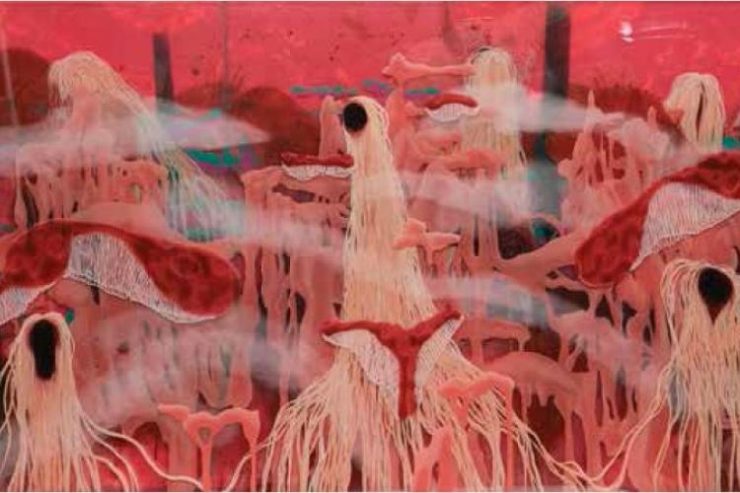BANDUNG artists Rendy Raka Pramudya and Restu Taufik Akbar translate their experienced reality into abstract pieces for an ongoing exhibition in Bandung, West Java. For the general public, abstract artworks can be, well, abstract. But perhaps in these abstractions viewers can find something deeper, something infinitely astounding.
These abstractions are inherently present in an ongoing exhibition organized by Art Sociates at the Lawangwangi Creative Space in Bandung, West Java. Running until May 13, the exhibition features works by the two contemporary artists, who were selected as finalists for the Bandung Contemporary Art Award (BaCAA) #5.
“Outlandish”, the exhibition’s title, refers to a state that is “bizarre, foreign, or unfamiliar”, explained the exhibition’s curator, Danuh Tyas, in describing the word that perfectly encapsulates the duo’s works. Outlandish is also an analogy or metaphor for the appreciation of artworks that are distanced from our everyday lives.
While “Outlandish” can be seen to describe abstract art in general, this exhibition in particular incorporates relatively unusual materials to be used in paintings; stainless steel plates and acrylic sheets, used by Restu and Rendy, respectively.
For Restu, the displayed artworks are a continuation of ideas and concepts featured in his previous exhibitions.
“My works talk about the material and immaterial reality, an impulse for the appreciator to understand both realities. They are a reflection of what I experience in nature and how I can portray the immaterial in these artworks,” Restu said.
He said he incorporated stainless steel plates to add another dimension to the perceived space and reality. “Paint on top of a canvas adds another layer, while with this medium, I can subtract instead.”
Restu’s paintings, which he said were inspired by his personal experience interacting with the “macro-cosmos” in the forests, feature a harmonious variance of colors as seen in nature, evoking explosions of petals and leaves in full bloom. In the abstract pieces, viewers could perceive imagery of trees, flowing water, and bridges, further emphasizing the natural aspect of the pieces.
The geometric lines, Restu said, were the “space signifier for the viewer” denoting the space where one could perceive and understand reality. This is compounded by the plates’ reflective nature, allowing viewers to see themselves as part of the artwork.
Meanwhile, Rendy’s exploration of space involves the usage of acrylic sheets, brushed over with vibrant and muted colors, creating multidimensional layers in what is a two-dimensional medium.
He said his works talked about space, since he had completed his final thesis at the Banding Institute of Technology’s School of Art and Design. Space is not only volume, as in height times width times length. […] Space is something that can be filled. I believe there exists one space humans cannot attain, and I want to fill that space with my paintings that try to avoid our perception toward an object or shape.
For Rendy, the acrylic sheets can also explain time. Unlike paint on canvas, which had an expected end result, he said the sheets enabled him to show the depth of the paintings thanks to the sheets’ transparency.
Meanwhile Art Sociates director Andonowati, whose interest was piqued after seeing the artists’ works at BaCAA, said she was pleased with how both artists had evolved with their latest exhibition. She first met the duo at BaCAA #5, which they participated in and where they were selected as two of 15 finalists. Their works, she added, had caught her attention and made her want to exhibit them independently, which was also a good chance to further introduce them to the world.
“I must admit, after seeing the two artists’ final works, I can sense that they both have matured in terms of visual and material selection as well as how they express the colors, which make their works aesthetically pleasing,” Andonowati said.
She also explained that I hope the exhibition can contribute to the development and diversity of not only Bandung’s art scene, but also Indonesia.” [thejakartapost.com]

















Add comment